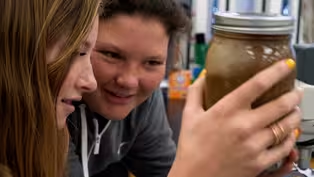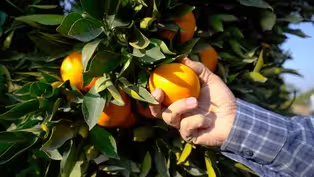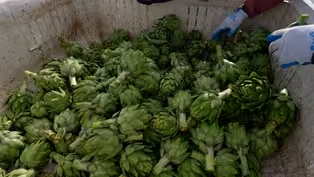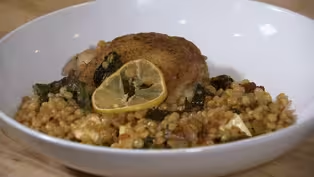
Sweet Cantaloupes
Clip: 6/30/2023 | 5m 41sVideo has Closed Captions
Cantaloupes make a sweet treat, picked and packed right off the vine.
Cantaloupes make a sweet treat, picked and packed right off the vine. The Turlock Fruit Company is best known for their sweet-tasting melons, particularly cantaloupes, honeydews and mixed melons. The family says they focus on flavor, producing the melons that efficiently transfer sugar from the plant to the melon.
Problems playing video? | Closed Captioning Feedback
Problems playing video? | Closed Captioning Feedback
America's Heartland is presented by your local public television station.
Funding for America’s Heartland is provided by US Soy, Sustainable Agriculture Research and Education, Rural Development Partners, and a Specialty Crop Grant from the California Department of Food and Agriculture.

Sweet Cantaloupes
Clip: 6/30/2023 | 5m 41sVideo has Closed Captions
Cantaloupes make a sweet treat, picked and packed right off the vine. The Turlock Fruit Company is best known for their sweet-tasting melons, particularly cantaloupes, honeydews and mixed melons. The family says they focus on flavor, producing the melons that efficiently transfer sugar from the plant to the melon.
Problems playing video? | Closed Captioning Feedback
How to Watch America's Heartland
America's Heartland is available to stream on pbs.org and the free PBS App, available on iPhone, Apple TV, Android TV, Android smartphones, Amazon Fire TV, Amazon Fire Tablet, Roku, Samsung Smart TV, and Vizio.
Providing Support for PBS.org
Learn Moreabout PBS online sponsorship♪♪ [Stephen Smith] It's all about flavor.
And when I get an email saying, "How did you do it to get these... these great melons?"
and "I look for your label now," that's what I enjoy.
I wouldn't trade it for anything.
Over 100 years ago, Steve Smith's grandfather- nicknamed James H. 'Cantaloupe' Smith- founded the Turlock Fruit Company, a fourth generation family farming business located in California's San Joaquin Valley.
[Stephen] We basically have three generations actively involved in the management of this company.
My dad, who's 92, is still active in the business.
Myself, I'm third generation.
And my son is now active in the business.
I think having three perspectives on business from three generations has been our- to our benefit, not a detriment.
Steve Smith's son-in-law, Neill Callis, is also an integral part of the family business.
In the late 1980s, the Smith family moved a majority of their farming operations from Turlock to an hour south, near the town of Firebaugh.
[Stephen] I'm sitting on soil that just is the best in the world for the kind of crops we grow.
The Turlock Fruit Company grows seven varieties of melons as well as asparagus, cherries, wheat for grain processing and tomatoes.
But they are best known for their sweet tasting melons, particularly cantaloupes, honeydews and mixed melons.
[Stephen] We're trying to differentiate ourselves by flavor, 'cause what really produces the best melons would be warm days and cool nights because it allows for the efficient transfer of the sugar from the plant to the melon.
[Neill] Honeydews are a member of the cucumber family.
And so, without the right amount of sugar, a honeydew tastes like a cucumber.
And it's been our experience that most consumers, when they eat a honeydew, it's in a fruit salad at a hotel maybe, and it doesn't have any flavor.
We grow for flavor.
On this day, crews are busy harvesting Honeydews.
[Neill] Our honeydews are grown starting in April, and then the growing process goes for about 100 days.
Once it's time to harvest, the crews come in, cut the melons from the vine, lift it onto the loader behind us, and we bring them into the shed in bulk trailers, where they're packed and sorted for quality.
We harvest about 125,000 melons per day, and we do that for 110 days during our harvest season.
And we try and ship that amount of product out every single day, just to keep pace so that the fruit is fresh.
In a nearby field, cantaloupes are also being harvested.
They're hand-picked as well.
[Alec Smith] They're too delicate to be harvested with machinery.
So, and that's why they're packed in the field, because it minimizes any handling.
It just goes right from the field into a box.
Uh, we're packing about 10,000 boxes a day.
And so, it's about a hundred thousand melons a day.
The melons are then transported over to the processing facility.
[Neill] Our cantaloupes and honeydews and mixed melons are distributed nationwide.
Uh, our honeydews are also exported to Japan, Korea and Taiwan.
So, my father-in-law, Steve, has worked for decades to settle on a variety that we can condition for stores that like ripe, ready-to-eat fruit, but also for honeydews that can, uh, take a two week ride to Japan and still, uh, be enjoyed by a consumer over there.
There has been a decrease in demand.
And there's a sad story to tell, um, on cantaloupes in particular, as... as the grocery chains have demanded a piece of fruit that has a longer shelf life.
The seed companies and other melon producers have transitioned to these longer shelf life melons, which, unfortunately, the trade off with shelf life is less flavor.
So, we've seen it dampen demand over the last decade in a pretty big way.
In honeydews, um, we're one of the last big shippers that focuses primarily on honeydews and doing a really good job there.
So, for us, the demand is pretty constant.
It's pretty high.
Another challenge the family faces is shared by growers in California's Central Valley and many other regions across the U.S.- the availability of water to grow their crops.
[Stephen] I'm farming in a desert, and the... and the biggest concern is getting the water that we need to grow this crop.
But we've become as efficient as we possibly can.
[Alec] There's only so much we can do as one farm.
So, our entire ranch is drip irrigated.
I think we probably irrigate the absolute minimum that we have to to get, uh, you know, a good crop and a good product.
[Stephen] They throw around that agriculture uses 40% of the water produced in the state.
Well, the water is transformed into food.
It's not- There isn't a sinkhole in the middle of the valley, where the water just flows down and into nothing.
It's food.
Despite the challenges, the family stands by their commitment to growing flavorful fruit that they've been known for over the decades.
[Neill] Nothing about this business is easy and, uh, one of the traits, I think, of any farmer that's still doing specialty crops or row crops in California, you've got to be really stubborn.
And I think that's a characteristic that applies to all of us.
[Stephen] It's too much work and too much stress to do unless you have a passion for it.
And I- Fortunately for me, I've got a much younger son that has a passion, but he's got energy and I'm- I've got the passion but not so much energy.
[Alec] I think our ability to survive is just, you know, it's been based on the foundation that was set by my great-grandfather and my grandfather... so, and that drives us to... to just try and do it better every year.
♪♪
Video has Closed Captions
Clip: 6/30/2023 | 4m 58s | Visit a school where every student is enrolled in an agricultural curriculum. (4m 58s)
Video has Closed Captions
Clip: 6/30/2023 | 5m 8s | Meet a family growing oranges for the long haul in California’s Central Valley. (5m 8s)
Fourth Generation Artichoke Farm
Video has Closed Captions
Clip: 6/30/2023 | 2m 11s | Meet a fourth-generation artichoke farmer. (2m 11s)
Lemon Couscous Chicken – Farm to Fork with Sharon Profis
Video has Closed Captions
Clip: 6/30/2023 | 5m 19s | Learn how to put together a Lemon Cous Cous Chicken dish for your family. (5m 19s)
Providing Support for PBS.org
Learn Moreabout PBS online sponsorship

- Food
Christopher Kimball’s Milk Street Television
Transform home cooking with the editors of Christopher Kimball’s Milk Street Magazine.












Support for PBS provided by:
America's Heartland is presented by your local public television station.
Funding for America’s Heartland is provided by US Soy, Sustainable Agriculture Research and Education, Rural Development Partners, and a Specialty Crop Grant from the California Department of Food and Agriculture.




